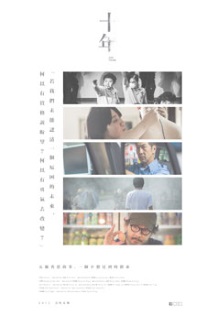
Ten Years won the Best Film award at this year’s Hong Kong Film Awards ceremony. Due to this, the Chinese government banned the ceremony from being broadcast on television as the film is fiercely critical of China’s rule of the territory. That makes this a big deal even if it’s just a low budget project conceived by a recent university graduate, Ng Ka-Leung, with no track record and with volunteers doing most of the work. It consists of a series of five short films, each made by a different director and cast.
The films differ quite a bit from one another in terms of both style and quality. The most outspokenly anti-China one is Self-immolator, a mockumentary about an unknown protester who self-immolates in response to the death in prison of a young supporter for Hong Kong independence. The government refuses to release the identity of the protester and a series of interviews covers how both the British and the Chinese government are to be blamed for failing to uphold the Sino-British Joint Declaration guaranteeing the territory’s right to self-determination. The references to similar events in Tibet are obvious as are those to the Umbrella Movement and the chilling takeaway from the film is that the Chinese government will never take the protests seriously unless someone dies. This is too strident a tone for my tastes as it seems to argue that self-immolation is a good way to demonstrate your dissatisfaction and in any case the film can’t quite make up its mind whether its supposed to be a documentary or a film of events.
The most philosophical of the films is the one directed by Ng himself. Entitled Seasons of the End, it is about a taxidermist couple who has moved on from preserving animal and plant specimens to documenting and storing artifacts from a house that was bulldozed by the government. What it means is ambiguously open to a variety of interpretations including perhaps a longing of preserving a local Hong Kong identity that is disappearing due to Chinese influence but the film takes a macabre turn when the man decides that he wants to be preserved and kept as a specimen himself. The simplest and shortest is Dialect, a story of a taxi driver who has trouble learning to speak Mandarin and finds himself increasingly on the margins of society as a result. It is implied that eventually even his son drifts away from him as the government all but forces everyone to use only Mandarin.
I won’t summarize all five of the films but in general while they are all competently enough made and have decent ideas, it’s also clear that they’re not exactly professional level quality. The first one for example, Extras, suffers terribly from the lack of a decent budget as its cheap production makes its story highly implausible. Partly for this reason, the most effective ones are those that tell small stories of individuals rather than the more ambitious ones. I’d say that the last story, Local Egg, starring recognizable actor Loi Kai-chi is the best of the lot about the government’s paranoid fear of the word “local”. The sight of 10 year old boys dressed in uniforms that evoke the Red Guard or Nazi Youth is probably the scariest shot in the film. I was also intrigued the hints in a couple of the films that the Hong Kong identity is very much tied to the territory itself and not isn’t ethnicity.
Predictably, many voices have come out condemning the act of conferring the Best Film award to Ten Years as a political act that is unjustified by the film’s own merits. I have to agree that under ordinary circumstances the quality of this project isn’t anything that is worthy of being lauded as the best film of the year. The production values verge on the amateurish at times and while the writing is passionate, it also betrays a lack of maturity. Yet at the same time, every film, no matter how innocuous, is a kind of political statement. That the judges chose this as a way to make their views known and that the public seem to have come out in a big way to show their support in the few places where this film was screened speaks of how few other avenues of protest are available to them. This may not be a great film but it’s a great way for the people of Hong Kong to demonstrate their defiance against China.